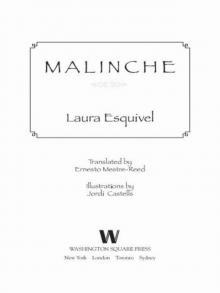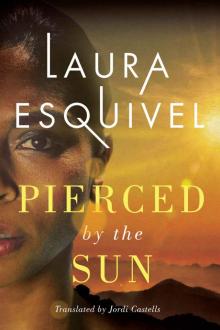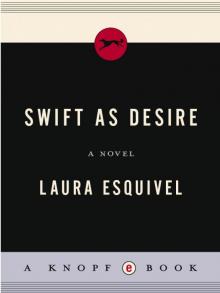- Home
- Laura Esquivel
Malinche Page 6
Malinche Read online
Page 6
Being “The Tongue” was an enormous responsibility. She didn’t want to make a mistake or misinterpret, and she couldn’t see how to prevent it since it was so difficult translating complex ideas from one language to the other. She felt as if each time she uttered a word she journeyed back hundreds of generations. When she said the name of Ometéotl, the creator of the dualities Omecíhuatl and Ometecuhtli, the masculine and feminine principles, she put herself at the beginning of creation. That was the power of the spoken word. But then, how can you contain in a single word the god Ometéotl, he who is without shape, the lord who is not born and does not die; whom water cannot wet, fire cannot burn, wind cannot move, and earth cannot bury? Impossible. The same seemed to happen to Cortés, who couldn’t make her understand certain concepts of his religion. Once she asked him what the name of God’s wife was.
“God doesn’t have a wife,” Cortés answered.
“It cannot be.”
“Why not?”
“Because without a womb, without darkness, light cannot emerge, life cannot emerge. It is from her greatest depths that Mother Earth creates precious stones, and in the darkness of the womb that gods and humans take their forms. Without a womb there is no god.”
Cortés stared intently at Malinalli and saw the light in the abyss of her eyes. It was a moment of intense connection between them, but Cortés directed his eyes somewhere else, abruptly disconnected himself from her, because he was frightened by that sensation of complicity, of belonging, and he immediately tried to cut off the conversation between them, for, aside from everything else, it seemed too strange speaking about religious matters with her, a native in his service.
“What do you know about God! Your gods demand all the blood in the world in order to exist, while our God offers His own to us with each Communion. We drink His blood.”
Malinalli did not understand all of the words that Cortés had just uttered. What she wanted to hear, what her brain wanted to interpret, was that the god of the Spaniards was a fluid god, for he was in the blood, in the secret of the flesh, the secret of love; that he was contained in the eternity of the Universe. And she wanted to believe in such a deity.
“So then your god is liquid?” Malinalli asked enthusiastically.
“Liquid?”
“Yes. Didn’t you say that he was in the blood that he offered?”
“Yes, woman! But now answer me, do your gods offer you blood?”
“No.”
“Aha! Then you shouldn’t believe in them.”
Malinalli eyes filled with tears as she replied.
“I don’t believe that they have to offer blood. I believe in your liquid god, I like that he is a god who is constantly flowing, and that he manifests himself even in my tears. I like that he is stern, strict, and just, that his anger could create or make the universe vanish in one day. But you can’t have that without water or a womb. For there to be songs and flowers, there needs to be water; with it, words rise and matter takes on form. There is life that is born without a womb, but it does not remain long on the earth. What is engendered in darkness, however, in the profundity of caves, like precious gems and gold, lasts much longer. They say that there is a place beyond the sea, where there are higher mountains, and there, Mother Earth has plentiful water to fertilize the earth; and here, in my land, we have deep caves and within them, great treasures are produced—”
“Really? What treasures? Where are these caves?”
Malinalli did not want to answer him and said that she did not know. His interruption bothered her. It proved that Cortés was not interested in talking about his religion, or his gods, or his beliefs, or even about her. It was clear that he was only interested in material treasures. She excused herself and went to weep by the river.
This and many other things made it difficult for them to understand each other. Malinalli believed that words colored memory, planting images each time that a thing was named. And as flowers bloomed in the countryside after a rainfall, so that which was planted in the mind bore fruit each time that a word, moistened by saliva, named it. For example, the concept of a true and eternal god, which the Spaniards had proclaimed, in her mind had borne fruit because it had already been planted there by her ancestors. From them she had also learned that things came to exist when you named them, when you moistened them, when you painted them. God breathed through his word, gave life through it, and because of this, because of the labor and grace of the God of All Things, it was possible to paint in the mind of the Spaniards and Mexicas new concepts, new ideas.
Being “The Tongue” was a great spiritual duty, for it meant putting all her being at the service of the gods so that her tongue was part of the resounding system of the divinity, so that her voice would spread through the cosmos the very meaning of existence. But Malinalli did not feel up to the task. Very often, when translating, she let herself be guided by her feelings and then the voice that came out of her mouth was no other than the voice of fear, fear of being unfaithful to the gods, of failure, fear of not being able to bear responsibility. And truthfully, also fear of power, of taking power.
Never before had she felt what it was like to be in charge. She soon found that whoever controls information, whoever controls meaning, acquires power. And she discovered that when she translated, she controlled the situation, and not only that but that words could be weapons. The finest of weapons.
Words were like lightning, swiftly crossing valleys, mountains, seas, bringing needed information as readily to monarchs as to vassals, creating hope or fear, establishing alliances, abolishing enemies, changing the course of events. Words were warriors, be they sacred warriors like the Lord Aguila, or simple mercenaries. As to their divine character, words transformed the empty space in the mouth into the center of Creation, repeating there the same act with which the universe had been made, by uniting the feminine and masculine principles into one.
Malinalli knew that if life was to thrive, and these two principles remain united, she had to position herself in a circular place to safeguard them, to blanket them, since circular forms were what best contained and protected all of creation. Sharp forms, on the other hand, broke things apart, separated them. The mouth, as feminine principle, as empty space, as cavity, was the best place for words to be engendered. And the tongue, as masculine principle, sharp, pointed, phallic, was the one to introduce the created word, that universe of information, into other minds in order to be fertilized.
But what would fertilize it? That was the great unknown. Malinalli was convinced that there were only two possibilities: union or separation, creation or destruction, love or hatred, and that the outcome would be influenced by “The Tongue,” that is, by herself. For she had the power with her words to include others in a common purpose, to clothe them, to shelter them. Or she could exclude them, making them into foes, separate beings with irreconcilable ideas; or into solitary beings who were isolated and destitute as she had been in her status as slave, feeling for so many years what it was like to live without a voice, without being taken into account and forbidden to make any decisions on her own.
But that past now seemed very far away. She, the slave who listened to orders in silence, who couldn’t look directly into the eyes of men, now had a voice, and the men, staring into her eyes, would wait attentively to hear what her mouth uttered. She, who had so often been given away, who so many times had been gotten rid of, now was needed, valued, as much as if not more than cacao.
Unfortunately, this privileged position was unstable and could change at any moment. Even her life was in danger. Only a victory by the Spaniards would guarantee her freedom, for reasons that she had not been afraid to state on various occasions in veiled language, that the Spaniards truly had been sent by the Lord Quetzalcóatl, and not only that, but that Cortés himself was the incarnation of the revered god.
Now it was she who could decide what was said and what went unsaid, what to confirm and what to deny, what would be made known a
nd what kept secret. It was a grave dilemma, for it wasn’t simply a matter of saying or not saying, or substituting one name for another, but that in doing so she ran the risk of changing the meaning of things. When translating, she could change what things meant and impose her own vision on events, and by doing so enter into direct competition with the gods, which horrified her. Because of her insolence, the gods could very well become annoyed with her and mete out their punishment, and this absolutely frightened her. She could avoid this fate by translating everything as closely to the meaning of the words as possible. But if the Mexicas were to question for a moment—as she herself had—whether or not the Spaniards had been sent by Quetzalcóatl, she would be destroyed along with them in the blink of an eye. So she found herself in a delicate position. Either she remained faithful to the gods and to the meaning that they had given to the world, or she followed her instincts, her most earthly and primary instincts, and made sure that each word and each action acquired the meaning that most suited her. The second choice was clearly a rebellion against the gods, and their eventual reaction filled her with fear and guilt, but she saw no other alternative.
Malinalli’s feelings of fear and guilt were at the least as powerful as those of Montezuma. Weeping, trembling, filled with dread, he awaited the punishment of the gods for how the Mexicas had destroyed Tula long before and in that sacred place dedicated to Quetzalcóatl, had engaged in human sacrifice. Before, in the Toltecan Tula, there had been no need for such practices. It was enough that Quetzalcóatl lit the new fire and accompanied the sun on its path through the celestial dome to maintain balance in the cosmos. Before the Mexicas, the Sun did not feed on human blood; it did not ask for it, did not demand it.
The great guilt that Montezuma bore on his shoulders made him certain that not only was it time to pay old debts but that the arrival of the Spaniards signaled the end of his empire. Malinalli could prevent this from happening. She could proclaim that the Spaniards had not been sent by Quetzalcóatl, and they would be destroyed in a moment … along with her, and she did not want to die a slave. She yearned to live in freedom, no longer to be given from one to another, no longer to lead such an errant life.
There was no going back, no way to come out unharmed. She knew too well Montezuma’s cruelty, and she knew that if the Spanish were defeated in their venture, she would be condemned to death. Faced with this possibility, she understandably wanted the Spanish to triumph. And if to assure their victory she had to keep alive the idea that they were gods come from the sea, she would do so, although by now she wasn’t very convinced of the idea. The hope that one day she would be able to do whatever she wanted, marry whom she wanted, and have children without the fear that they might be taken into slavery or destined as sacrifices, was enough to make her take a step back. What she most wanted was a piece of earth that belonged to her and where she could plant her grains of corn, the ones that she always carried with her and that had come from her grandmother’s cornfield. If the Spaniards could make sure that her dreams would crystallize, then it was worthwhile helping them.
Of course, this didn’t assuage her guilt or make clear to her what she should say and what she should keep silent about. What kind of a life is worth defending with lies? And who could confirm that they were lies? Perhaps she was being too harsh. Perhaps the Spaniards had been sent by Quetzalcóatl and it was her duty to collaborate with them until she died, sharing with them privileged information that had come directly from the mouth of a woman in Cholula. This woman had loved Malinalli’s confident personality, her beauty, and her physical strength, and she wanted her as a wife for her son. With the intent of saving Malinalli’s life she had confided in her, warning her that in Cholula they were preparing an ambush against the Spanish. The plan was to arrest them, wrap them up in hammocks, and take them to Tenochtitlán alive. The woman suggested that Malinalli leave the city before this happened and that afterward she could marry her son.
Malinalli now had the burden of deciding whether or not to share this information with the Spaniards. Cholula was a sacred place. One of Quetzalcóatl’s temples was situated there. The defense or attack of Cholula meant the defense or attack of Quetzalcóatl. Malinalli was more confused than ever. The only thing she was sure of was that she needed silence to clear her mind.
She implored the gods for silence. What most tormented her, aside from the external noises, were the noises within, the voices in her mind that told her not to say anything, not to give the Spaniards any valuable information that might save their lives, for something was wrong. Perhaps the foreigners were not who she thought they were, not the envoys of Quetzalcóatl. Certainly their recent behavior did not conform to the ideal model that she had devised. She felt disillusioned.
For one thing, there was a total incongruity between the meaning of the name Cortés (courteous) and the man himself. To be cortés was to be sensitive and respectful, and she didn’t think the man possessed either of these attributes, nor did the men that he had brought with him. She couldn’t believe that god’s emissaries would behave in such a manner, that they would be so rough, so rude, so ill spoken, even insulting their own god when they were angry. Compared to the gentleness and lyricism of the Náhuatl, Spanish was a bit aggressive.
There was one thing, though, that was worse than the unpleasant manner with which the Spanish gave orders, and that was the odor that emanated from them. She never expected that the emissaries of Quetzalcóatl would smell so bad. Cleanliness was common practice among the natives. The Spaniards, on the other hand, did not bathe, their clothes reeked, and neither water nor the sun could rid them of their stench. No matter how much she scrubbed and scrubbed the clothes in the river, she wasn’t able to wash from them the smell of rotted iron, of metallic sweat, of rusted armor.
Moreover, the interest that the Spanish and Cortés in particular expressed for gold did not seem right to her. If they in fact were gods, they would be concerned with the earth, with the planting, with making sure that men were nourished, but that was not the case. Never had she seen them interested in the cornfields, only in eating. Hadn’t Quetzalcóatl stolen the grain of corn from the Mount of Our Sustenance to give it to mankind? Didn’t the Spanish care how the gift had affected men? Weren’t they curious to know whether or not they were reminded of its divine origin when they ate it? Whether or not they protected it and venerated it as something sacred? Did they care about what would happen if man stopped planting it? Didn’t they know that if man stopped planting corn, it would die out? That the ear of corn needs man’s intervention to strip it of the leaves that cover it, so that the seed may be free to reproduce? That there is no way for corn to live without man, nor man to live without corn? The fact that corn needed man to reproduce was proof that it was a gift from the gods to mankind, for without mankind there would have been no need for the gods to give away corn, and mankind, on the other hand, would not have been able to survive on the earth without corn. Didn’t the Spaniards know that we are the earth, from earth we were born, that the earth consumes us, and when the earth comes to its end, when the earth is exhausted, when corn no longer sprouts, when Mother Earth no longer opens her heart, it will be our end as well? Then what was the point of accumulating gold without corn? How was it possible that the first word Cortés learned in Náhuatl was precisely the one for gold and not corn?
Gold, known as teocuitlatl, was considered to be the excrement of the gods, waste matter and nothing else, so she didn’t understand the desire to accumulate it. She thought that when the day came that the grain of corn was not revered and valued as something sacred, human beings would be in grave danger. And if she—who was a mere mortal—knew this, how was it possible that the emissaries of Quetzalcóatl, who came in his name, though under a different guise, who communicated with him, did not know it? Was it possible that these men were more likely emissaries of Tezcatlipoca than Quetzalcóatl?
Quetzalcóatl’s brother had once deceived him with a black mirror, and th
at is what it seemed the Spaniards were doing with the natives, but this time with resplendent mirrors. Tezcatlipoca, the god who sought to overthrow his brother, was a magician. Showing off his talents, he sent a black mirror to Quetzalcóatl in which Quetzalcóatl saw the mask of his false holiness, his dark side. In response to such a vision, Quetzalcóatl got so drunk that he even fornicated with his own sister. Full of shame, the following day he left Tula to find himself again, to recover his light, promising to return one day.
The great mystery was whether indeed he had returned or not. What was most troubling for Malinalli, independent of whether or not the Spaniards achieved victory over Montezuma, was that her life and liberty were at risk. All this had begun months earlier, when Cortés had accidentally found out that she spoke Náhuatl. Since Aguilar—who in all the years that they had spent in these lands had only learned Mayan—couldn’t help Cortés in understanding Montezuma’s messengers, Cortés asked Malinalli to help him translate and in exchange he would grant her her liberty. From that moment on, events followed one after another with extraordinary speed, and now Malinalli found herself trapped in a whirlpool that allowed no escape. Images of moments that had sealed her destiny, going back to the days when the Spaniards had first landed, appeared and disappeared in her mind.
Foremost was the day when the chief of Tabasco had gathered her along with the nineteen other women to tell them that they would be given away as spoils of war to those who had recently arrived, since the foreigners had battled and defeated the people of Cintla.
She remembered in detail the conversation that had taken place among the women on the journey to the Spanish camp. Almost in secret they mentioned the possibility that there might be a connection between the men that arrived from the sea and Quetzalcóatl. The current year was a One Sugarcane year which, according to the Mexica calendar, was the year of Quetzalcóatl, who had been born during a One Sugarcane year and died after a cycle of fifty-two years, also a One Sugarcane. It was said that the coincidence of the Spaniards having arrived during a One Sugarcane year was too powerful to ignore. One of the women said that she had heard that One Sugarcane years were disastrous for kings. If something bad happened during a One Lizard year, the evil befell men, women, and the old. If it happened during a One Jaguar, One Deer, or One Flower year, it befell children, but if it happened during a One Sugarcane year, it befell kings. This had been made evident by the fact that the foreigners had battled triumphantly against the citizens of Cintla and would likewise triumph if they confronted Montezuma. This was a sign that they had come to conquer and to reinstate the kingdom of Quetzalcóatl. And so Malinalli accepted it in her heart; on listening to these words, she was filled with joy and hope and illusion, with a longing for change. To know that the kingdom that permitted human sacrifices and slavery was in peril made her feel at peace with herself.

 Like Water for Chocolate
Like Water for Chocolate Malinche
Malinche Pierced by the Sun
Pierced by the Sun Swift as Desire
Swift as Desire![[2013] Pierced by the Sun Read online](http://i1.bookreadfree.com/i2/04/10/2013_pierced_by_the_sun_preview.jpg) [2013] Pierced by the Sun
[2013] Pierced by the Sun